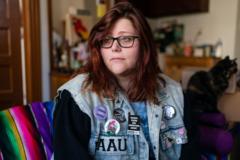President Donald Trump has officially pardoned 23 anti-abortion activists, a decision made just before the annual March for Life rally in Washington D.C. This controversial move has drawn sharp reactions from both supporters and opponents of abortion rights. While Trump views the convictions as a miscarriage of justice, abortion rights advocates argue it further highlights his stance against reproductive freedoms.
Trump Grants Pardons to Convicted Anti-Abortion Activists Ahead of March for Life

Trump Grants Pardons to Convicted Anti-Abortion Activists Ahead of March for Life
In a controversial move, President Trump pardons 23 anti-abortion activists, sparking debate on his stance regarding reproductive rights.
Trump issued the pardons on Thursday as part of several executive orders during his presidential term. He characterized the convictions of the activists, including some who obstructed access to a reproductive health clinic and intimidated patients, as "ridiculous." This pardon comes as anti-abortion protesters prepare to gather in the capital for the heavily publicized rally, which Trump is set to address through video link.
Among those pardoned is Lauren Handy, a prominent figure in the anti-abortion organization known as Progressive Anti-Abortion Uprising (PAAU). Handy and her associates were convicted of conspiracy in 2020 for breaking into a Washington health facility to disrupt services, resulting in injuries to clinic staff. Handy's sentencing took place in May 2024, but her supporters claim the legal actions against her were politically motivated.
Marjorie Dannenfelser, president of Susan B Anthony Pro-Life America, lauded Trump's actions, stating they reflect his commitment to anti-abortion advocacy, while criticizing the Biden administration's Department of Justice for prosecuting the activists. However, critics, including the national abortion rights group Reproductive Freedom for All, argue that Trump's pardons reaffirm their long-held belief that he is staunchly anti-abortion, despite his earlier claims of leaving abortion decisions to individual states.
With abortion rights a focal point in recent political campaigns and the Supreme Court's contentious decision to overturn Roe v. Wade in 2022, the pardons underscore the ongoing national debate over reproductive rights. Trump's decision continues to stir discussions about the implications of his policies on American society and the politicization of reproductive health issues.
Among those pardoned is Lauren Handy, a prominent figure in the anti-abortion organization known as Progressive Anti-Abortion Uprising (PAAU). Handy and her associates were convicted of conspiracy in 2020 for breaking into a Washington health facility to disrupt services, resulting in injuries to clinic staff. Handy's sentencing took place in May 2024, but her supporters claim the legal actions against her were politically motivated.
Marjorie Dannenfelser, president of Susan B Anthony Pro-Life America, lauded Trump's actions, stating they reflect his commitment to anti-abortion advocacy, while criticizing the Biden administration's Department of Justice for prosecuting the activists. However, critics, including the national abortion rights group Reproductive Freedom for All, argue that Trump's pardons reaffirm their long-held belief that he is staunchly anti-abortion, despite his earlier claims of leaving abortion decisions to individual states.
With abortion rights a focal point in recent political campaigns and the Supreme Court's contentious decision to overturn Roe v. Wade in 2022, the pardons underscore the ongoing national debate over reproductive rights. Trump's decision continues to stir discussions about the implications of his policies on American society and the politicization of reproductive health issues.





















